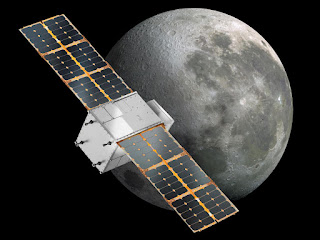REVISITING THE MOON RACE AFTER 50 YEARS
As the world's most powerful 'Space Launch System' rocket carrying atop the Orion capsule arrived at the launch pad of Kennedy Space Center , Florida for its final tests before embarking on a landmark mission to the Moon, the moon race is back again. NASA is going to resume from where it had left in 1972 which was the last crewed lunar mission with Apollo 17 spacecraft. With its ambitious Artemis program, NASA aims not just for our nearest celestial neighbour, but a long term goal to explore the deep space in a way that has never happened before.
If everything goes right, the first Artemis mission will fly off in late May this year, injecting an uncrewed Orion capsule into lunar orbit which will ultimately return to the Earth after 6 days . This will be followed by a second Artemis mission in 2024 carrying four crew members to the lunar orbit who, without landing on the moon, will be brought back to the Earth in the Orion capsule with an atmospheric re-entry and splashdown in the sea. The most crucial third Artemis mission of 2025 will actually land four astronauts on the Moon including a woman who will spend 6 days there before returning to the Earth. The other successive missions of the series will be utilized to build up a Artemis base camp on the Moon's surface and a Moon Gateway in the lunar orbit that will help landing a number of hardwares on the moon including humanoids and robots for extensive study by the future astronauts taking advantage of its extended infrastructural buildup. This will also provide an easy transit platform for the astronauts to step on the Moon.
The mission is named after Artemis, the mythological Greek goddess of the Moon and the twin sister of Apollo. The crewed capsule Orion owes its name to one of the prominent constellations of the night sky who, in Classical mythology, was the hunting companion of Artemis.
The implications of the Artemis mission are many. First, the mission will be a different one from the earlier Apollo program as , through this, NASA will be able to establish a permanent and sustainable presence on the Moon to prepare for missions to Mars and beyond some of which will be manned ones which had not been accomplished before. While the crew of the last Apollo-17 mission spent only 3 days on the Moon, Artemis plans to extend the trip for weeks or possibly for months. Second, the mission will provide a platform for new scientific discovery and enhance our knowledge on the Moon, as the mission will be able to retrieve samples more strategically than during the Apollo era. Third, the mission would usher in economic benefits for associated industries and provide inspiration for a new generation of explorers while reaffirming American supremacy in space, even overtaking its traditional competitors like Russia and China. The discovery of water on the Moon and potential deposits of rare minerals hold promise for both scientific and economic exploration and exploitation of the Moon. Fourth, this will pave the way for the building of a new global alliance and private partnership to explore the depths of the heavens for the benefit of the entire humanity. The Artemis programme is one of NASA's first large scale collaborations with commercial companies such as Blue Origin, SpaceX and Boeing.
The entire cost of the mission will be a whopping $93 billion ( which may also escalate further due to time delay) which will heavily impact the individual taxpayers for which many critics argue against the program. However, unraveling the secrets of nature and opening up a new world that will someday become the cradle for our future generations is what should matter the most for humanity. Our sphere of living should be extended further beyond the earth limits to encompass new horizons to ensure the flexibility and continuity of the human race in the universe in the event of a catastrophic event threatening our very existence on the planet. In that case , the space beyond earth will be our new frontier to propagate the unique human species. In this venture, we won't simply consider ourselves as citizens of a particular region like the Indians , the Americans or the Britons, but a whole global community belonging to a single planet Earth in our pursuit to collectively fight the challenge. If that sense of consciousness is able to be aroused in this existing coercive world by the technological innovations associated with the Artemis mission, then it would be a program worth spending!
Nikunja BIhari Sahu Education Officer
Regional Science Centre
Bhopal
Phone : 8018708858




Comments
Post a Comment